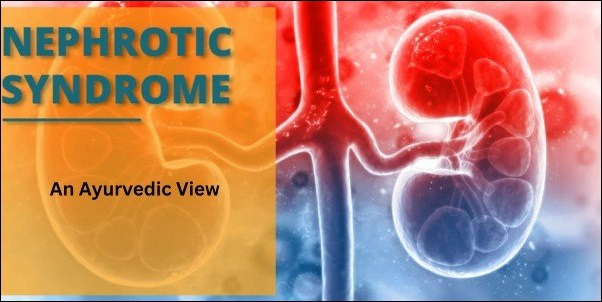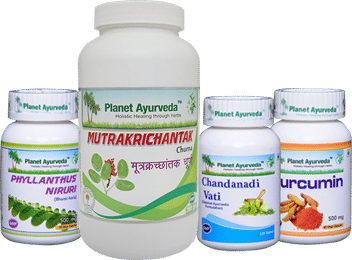Ayurvedic Treatment for Nephrotic Syndrome with Herbal Remedies
ABSTRACT
Nephrotic syndrome is a group of clinical signs and symptoms caused by damage to the kidney. Nephrotic syndrome is a rare condition, though its occurrence is influenced by various factors such as age, underlying health condition and geographical location. It is most often seen in children between the age of 1 and 6 years. In adults, nephrotic syndrome is less common but still occurs. Higher rates of nephrotic syndrome are often seen in individuals with predisposing conditions such as diabetes and hypertension. Its early diagnosis is crucial for effective management and to prevent long-term kidney damage. Starting treatment early and managing nephrotic syndrome effectively can enhance a patient’s health and overall well being. This will help in maintaining a better quality of life.

INTRODUCTION
Nephrotic syndrome occurs when the kidney is damaged, particularly the glomeruli. Glomeruli are small clusters of blood vessels responsible for filtering waste and excess fluid from the blood. These are tiny filtering units. When these filtering units become damaged, they can no longer retain essential protein, such as albumin, in the bloodstream. This results in leakage of large amounts of protein into the urine, this condition is called proteinuria. The loss of protein causes the blood level to drop, leading to swelling (edema), particularly in legs, ankles and around the eyes. Nephrotic syndrome can be caused by a range of factors, including autoimmune diseases, infections or genetic disorders. If left untreated, it can lead to chronic kidney disease (CKD) or even end-stage renal disease (ESRD).
CAUSES
Nephrotic syndrome can result from several different factors, which are typically characterised in to primary (directly affecting the kidney) and secondary(due to other systemic condition), they are as follow:
1. Primary Cause (directly affecting the kidney)
- Minimal Change Disease (MCD): It is the most common cause of nephrotic syndrome in children. In this glomerular damage occurs at molecular level.
- Focal Segmental Glomerulosclerosis (FSGS): Involves scarring in certain areas of the glomeruli, this causes protein leak in the urine and kidney dysfunction.
- IgA nephropathy: It occurs when immunoglobulin A (IgA) builds up in the kidney, leading to inflammation and damage to the kidneys filtering unit.
- Congenital Nephrotic Syndrome: It is a genetic form of nephrotic syndrome that typically appears in infants.
- Membranous nephropathy: It is linked to immune system abnormalities. It is characterised by thickening of the glomerular basement membrane, that disrupts kidney function.
2. Secondary Cause (due to other systemic condition)
- Diabetic nephropathy
- Systemic lupus erythematosus
- Amyloidosis
- HIV/AIDS
- Hepatitis B or C
- Hypertension
- Cancer
SYMPTOMS
The symptoms of nephrotic syndrome occur because the kidney can no longer filter blood properly. The severity of the symptoms differ based on the cause of the condition. They are as follow:
- Edema – swelling in legs, feet, ankles and around the eyes.
- Foamy or frothy urine – It is due to protein in urine.
- Hypoalbuminemia – loss of protein results in low level of protein in the blood.
- Hyperlipidemia – High cholesterol and triglyceride level in the body.
- Tiredness and weakness – people feel tired and weak, which can be due to low protein levels.
- Rapid weight gain – The buildup of fluid in the body can lead to a rapid weight gain.
- Loss of appetite – People can experience nausea and lack of hunger.
- Blood clots – Nephrotic syndrome can disrupt the balance of protein that normally prevents blood clotting, increasing the risk of clot formation in legs or lungs.
- Changes in urination patterns: Some may experience frequent urination, while others may experience a decreased amount of urine production.
- Muscle weakness: Loss of protein can lead to muscle wasting, leading to difficulty in everyday activities.
DIAGNOSIS
The diagnosis of nephrotic syndrome involves:
1. Urine Test
- Proteinuria: >3.5 grams of protein per day.
- Urine Albumin-to-Creatinine ratio: > 30 mg/g
- Foamy urine
2. Blood Tests
- Serum albumin: <2.5 g/dl
- Cholesterol and lipid level: Total cholesterol > 300 mg/dl and elevated triglyceride.
- Creatinine: Maybe normal in the early stage, but can increase with progression of disease.
3. Imaging Tests
- Ultrasound: to check the signs of kidney damage or abnormality.
Kidney biopsy
- Ultrasound: to check the signs of kidney damage or abnormality.
Kidney biopsy
It is done to identify the underlying cause.
TREATMENT
The treatment of nephrotic syndrome focuses on managing symptoms, preventing complications and treating underlying causes. The key components of treatment involve:
1. Dietary Management
- Low sodium diet to control swelling and hypertension.
- Protein intake is advised to replace the lost protein in the urine.
- Low fat diet
2. Manage underlying conditions
- Controlling blood pressure
- Managing diabetes
- Treating infections
3. Medications
- Corticosteroids
- Immunosuppressive drugs
- Diuretics
- Statins
- Anticoagulants
4. Dialysis or kidney transplant
- Dialysis may be required to filter waste and excess fluid from the body.
- Kidney transplant may be necessary in end-stage renal disease (ESRD).
COMPLICATIONS OF NEPHROTIC SYNDROME
- Chronic kidney disease (CKD)
- End-stage Renal Disease (ESRD)
- Cardiovascular disease
- Malnutrition
- Osteoporosis
- Ascites
- Pleural effusion
AYURVEDIC ASPECT
मेदोवहानां स्रोतसां वृक्कौ मूलं वपावहनं च !!
Ancient Reference – (Ch.Vi.5/8)
Medovaha srotodushti (disruption of fat carrying channels) is a concept in ayurveda that can be observed in conditions like nephrotic syndrome. According to ayurvedic classical texts, the moola (root) of medovaha srotas is located in the vrikka (kidneys and adrenal gland) and vapavahan (carrier of fat). The vrikka (kidneys and adrenal gland) produce important hormones that are linked to metabolism of fats. In nephrotic syndrome, fat metabolism is significantly impaired, leading to issues such as hypercholesterolemia (high cholesterol level). The involvement of vrikka (kidneys and adrenal gland) in nephrotic syndrome suggest an imbalance in the medovaha srotas (fat carrying channels), caused by the weakening of dhatwagni (body tissue fire) in the meda dhatu (fat tissue). When dhatwagni (body tissue fire) is weak, particularly in meda dhatu (fat tissue), it results in improper fat metabolism and can lead to abnormal accumulation or deposition of fat in the body. This leads to symptoms such as proteinuria(excess protein in urea), edema, hypoalbuminemia (low level of albumin in blood) and hyperlipidemia (high level of lipid in blood). To manage these conditions in nephrotic syndrome, the focus is on restoring the balance of medovaha srotas (fat carrying channels) by improving dhatwagni (body tissue fire).
MANAGEMENT OF NEPHROTIC SYNDROME
The conventional medicine tends to focus on treating the symptoms and underlying cause with the medication. While ayurvedic herbs aim to restore balance to the kidney, support healthy fluid metabolism and improve overall health of the body. Ayurvedic approach in managing nephrotic syndrome include:
1. Herbs
- Guduchi (Tinospora cordifolia): It is known for its anti-inflammatory, antioxidant and its ability to balance the immune system. These qualities make it particularly beneficial for managing nephrotic syndrome.
- Punarnava (Boerhavia diffusa): It is known for its diuretic and anti-inflammatory properties. It helps to reduce swelling and maintain healthy kidney.
- Ashwagandha (Withania somnifera): It helps to reduce stress and support kidney functions.
- Ajwain (Carom seeds): It aids in digestion and improves metabolic functions.
2. Panchkarma Therapies
- Snehana (Oil massage): It helps in nourishing and lubricating body tissues. It promotes relaxation, reduces fluid retention and improves circulation and nutrient flow.
- Swedana (Sweat therapy): In this process, sweating is induced through steam. It helps to remove toxin and balance fluid retention.
- Vamana (Therapeutic Vomiting): It helps remove excess Kapha, reducing fluid retention and swelling by expelling toxins from the body.
- Virechana (Therapeutic Purgation): It helps cleanse the digestive system, reduce kidney inflammation, and improve digestion.
HERBAL REMEDIES FOR NEPHROTIC SYNDROME BY PLANET AYURVEDA
Planet Ayurveda is a reputable GMP-certified company that focuses on producing and exporting Ayurvedic herbal supplements and products. They ensure the highest quality by sourcing raw materials from trusted suppliers. Their products are made from natural herbs, free from chemicals and preservatives, ensuring safety and effectiveness. One of their popular offerings is the Nephrotic Syndrome Care Pack, which is specifically designed to support individuals with nephrotic syndrome. This care pack includes a combination of Ayurvedic herbs that help improve kidney function, reduce protein loss in urine, and support overall health. It is a natural and safe alternative to help manage the symptoms of nephrotic syndrome.
PRODUCTS DESCRIPTION


1. MUTRAKRICHANTAK CHURNA
It is a blend of potent herbs, including Varun (Crataeva nurvala), Bhumi Amla (Phyllanthus niruri), Kalmegh (Andrographis paniculata) and other herbs. These ingredients work together to help restore balance to the body’s doshas and support optimal kidney health. The combination of these herbs is known for promoting proper kidney function and enhancing the overall wellness of the urinary system. Bhumi Amla (Phyllanthus niruri) helps in detoxification of liver and kidney, preventing the formation of kidney stones. Kalmegh (Andrographis paniculata) has anti-inflammatory and detoxifying properties. Together these herbs help to improve renal functions.
Dosage: Take 1 teaspoon twice daily with warm water.
2. CHANDANADI VATI
This natural tablet formulation which contains powerful herbs, including Shveta Chandana (Santalum album), Gandha Biroja Satva (Pinus longifolia), Amalaki (Emblica officinalis), Karpura (Cinnamomum camphora), Chandana Taila (Sandalwood oil) and several other herbs. These ingredients work together to help cool the body and promote relaxation. This combination is particularly beneficial for managing conditions like nephrotic syndrome. This formulation helps in controlling internal heat and maintaining balance in doshas (humors).
Dosage: 2 tablets, three times a day after meals with warm water.
3. PHYLLANTHUS NIRURI
These capsules are herbal supplements made from a standardized extract of Bhumi Amla (Phyllanthus niruri). This herb has a bitter and pungent taste, with a cooling effect on the body. It is known for its beneficial properties, such as promoting digestion, reducing excess heat (Pitta), improving vision, and balancing mucus (Kapha). It boosts the immune system and maintains healthy tissues.
Dosage: 2 capsules, two times a day after meals with warm water.
4. CURCUMIN CAPSULES
These capsules are herbal supplements made from a standardized extract of haridra (Curcuma longa). Curcumin, the primary active compound in turmeric, plays a vital role in supporting a healthy immune system. These capsules are highly effective in managing conditions like nephrotic syndrome.
Dosage: 2 capsules, two times a day after meals with warm water.
CONCLUSION
In this article I have concluded about nephrotic syndrome. Nephrotic syndrome requires careful diagnosis and management. In this article we discussed its causes, symptoms, diagnosis, management, its ayurvedic aspect and herbal remedies.



